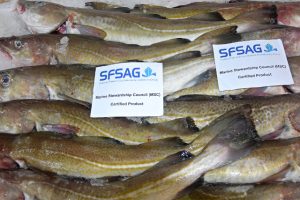The Marine Conservation Society (MCS) has urged consumers to turn away from cod and haddock in favour of eating what it says are more sustainable but less popular species such as herring, dab, Cornish hake and mackerel.
This is despite the fact that cod and haddock stocks are abundant in the North Sea and are MSC-certified. The recommendations are in the MCS’s ‘Good Fish Guide’ that grades fish and shellfish with green, amber and red codes depending on how sustainable the MCS perceives the species to be.

MSC-accredited North Sea Cod
It recommends that consumers should eat less of the ‘big five’ species of cod, haddock, salmon, prawns and tuna, and more of the lesser-known species.
Megrim from Rockall, the northern North Sea and west of Scotland; North Sea line- and trap-caught or UK farmed turbot; line-caught pollack from the Celtic Sea; lemon sole, seine-netted from the North Sea and eastern English Channel; and queen scallop, traditionally caught in the Fal Estuary in Cornwall, are all now on the Good Fish Guide green-rated ‘best choice’ list.
The MCS says that as the UK prepares to leave the EU now is the time to swap the traditional UK top five favourite fish for new choices.
“We’re suggesting that dab, hake, herring, mussels and mackerel become the new cod, haddock, salmon, prawns and tuna,” says Bernadette Clarke, MCS Good Fish Guide programme manager.
“UK consumers tend to stick to their tried and tested top five – both in taste and familiarity, but not always sustainability,” says Bernadette Clarke.
“Cod, tuna, salmon, haddock and prawns from the right sources are all OK, but there’s so much more to explore. By choosing from a wider range, we’ll be putting far less stress on individual fisheries.”
Best choice top 10:
- Dab, seine-netted in the North Sea
- MSC-certified hake from Cornwall
- MSC-certified herring from Irish, Celtic and North Seas, SW Ireland and Eastern English Channel
- Mackerel, hand-lined in the southwest of England, and MINSA (Mackerel Industry Northern Sustainability Alliance) North East Atlantic MSC-certified
- Megrim from the northern North Sea and west of Scotland
- UK rope-grown mussels
- Brown crab from Devon inshore potting area, Western Channel
- Queen scallops from the Fal estuary, fished by traditional sail and oar method
- Pollack hand-lined from the Celtic Sea
- Dover sole from the Western Channel
Species in the MSC’s ‘red list’ of fish to avoid include wild seabass, skate, shark, spurdog, wild Atlantic salmon, red mullet, nurse hound, and cuckoo, spotted and roker ray species.
Improving, and off the red list, are undulate ray from the English Channel.





